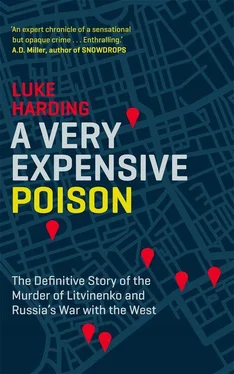Despite his contempt for the British ‘establishment’, Lugovoi turned out to be an Anglophile. He was a fan of English literature; the works of Arthur Conan Doyle sat in a glass-fronted cabinet case. ‘I’ve read all Conan Doyle. I’m very fond of The Lost World ,’ he explained. His son went to the same British school in Moscow as my son, though at a different campus. His daughter spent a year on an English course in Cambridge.
Lugovoi’s assistant, Sophia, brought us tea. On the wall was a photo of Putin shaking hands with Berezovsky; another jokey montage showed the president chopping the head off the exiled oligarch Mikhail Khodorkovsky. There were framed snaps from Lugovoi’s days in the Federal Protection Service, when he accompanied Kremlin politicians including Boris Yeltsin and prime minister Yegor Gaidar. I spotted two photos of his trips with Gaidar to Washington.
I asked Lugovoi why he had joined the KGB’s ninth directorate, responsible for government security. ‘They invited me. Any normal Soviet officer would take it as an honour to be in the KGB. It means that you are the best.’ Lugovoi denied that he was ever a spy and said his job in the early 1990s, as head of a Kremlin platoon, was rather boring. Instead of intelligence work he trained new recruits to perform ceremonial drills in Red Square.
What happened in London? Lugovoi’s answer: nothing much. He claimed Litvinenko insisted on a meeting, picked the Millennium Hotel as venue, and called him ‘at least five times’. This was, as phone logs later demonstrated, untrue: it was Lugovoi who called Litvinenko. As for the tea: ‘I’ve always said I can’t remember whether we ordered tea at all. I remember that I drank some whisky or gin. Then Litvinenko arrived. He said next to nothing. He was very excited.’
Not all of what Lugovoi said was deceitful. He recounted how Litvinenko rang him at 8.30 a.m. on 2 November and explained he was feeling ill and couldn’t make their meeting later that morning. Lugovoi phoned Litvinenko in hospital on 7 November (‘We had an excellent conversation’) and on 13 November – the last call before his death. Lugovoi said Litvinenko had told him he worked for British intelligence: ‘He was definitely an agent of the English security services.’ Lugovoi took a dim view of MI6, which recruited its agents ‘in the pub’.
It was strange. Lugovoi had a certain charm. In person he was disarming. His tale of virtuous innocence and wrongful insinuation even seemed plausible, until you remembered the chilling facts. He smiled, joked, made rueful expressions with his face, and tossed the occasional word of English into his Russian (‘absolutely’). He was wearing the same kind of clothes – a pink shirt, fashionable cuffs, grey business suit – that had prompted hotel staff in London to snigger.
By this point, Lugovoi had given dozens of interviews to journalists. In each, he stuck to the same blameless formula: he wasn’t a murderer but the victim of conspiracy. At key points, his recall of events was fuzzy. Why couldn’t he remember what drinks he ordered at the Millennium Hotel? It wasn’t an encounter you would forget. He was lying, there was no doubt. Underneath his smooth persona was something cold, cruel and terrifying.
Before my interview with Lugovoi, I bumped into Kovtun outside the office. When I emerged he was waiting for me. He had the air of someone with not much to do. Though he didn’t say so, he seemed jealous of Lugovoi’s fame and obvious material success. In the wake of the CPS’s murder charge, Lugovoi became, for many Russians, a national hero. Kovtun – not charged until 2011 – was a footnote.
We chatted for ten minutes. Kovtun said his situation frustrated him. His attempts to clarify whether he was under suspicion had been unsuccessful. He wanted to go back to Germany but not if that meant arrest and jail. ‘There are no guarantees. I don’t want to risk it,’ he told me. Kovtun said that he was still on good terms with his ex-wife Marina, who had visited him in Russia over New Year. She’d remarried, had kids, started a new life.
Kovtun said he ended up in the Pine Bar because of a series of coincidences – in Germany his passport renewal went quicker than he expected; he and Andrei sat in the bar because Lugovoi’s family hadn’t returned from Madame Tussauds. But what about the polonium? The trail went to his hotel bedroom, didn’t it? ‘By the time the polonium was found, twenty days had passed. There was plenty of time for the British intelligence services to organise lots of things,’ he replied.
Kovtun wrote down his mobile number for me. He was stuck in Russia, but felt things could be worse. ‘We go on holiday in Siberia and Altai,’ he said. ‘It’s a big country.’
Not long after our conversation, Kovtun broke off all contact with Lugovoi. After 2009 they maintained no relations whatsoever. The two murderers, for whatever reasons, had fallen out.
* * *
One of Russia’s most popular social networking platforms is LiveJournal.com. Alex Goldfarb ran a page on the site devoted to the Litvinenko case. One day, Goldfarb received an intriguing email. Its sender, ‘thepotemkin’, said he had information that might be of interest. It concerned polonium.
Goldfarb suggested that he and the source – his name was Alexei Potemkin – communicate via Skype. Potemkin explained his background. He was, he said, an FSB agent working undercover in Austria. He claimed to have met Litvinenko in the mid-1990s. And been part of the transportation chain that smuggled the polonium from Russia to London.
Goldfarb was wary. Was this an FSB set-up? He met Potemkin in Austria four times. It turned out Potemkin was disillusioned with his job – spying on Austria’s Chechen diaspora – and wanted out. Potemkin said that in 2006 an FSB courier delivered a sealed container with radioactive markings. His job was to deposit it with left luggage at Innsbruck Station. The package was the size of a photo. In it was a sealed vial. The vial had a coded lock.
According to Potemkin, the FSB began to carry out espionage missions abroad from 2000. The SVR, Moscow’s foreign-intelligence agency, resented this. Potemkin said his ultimate boss was Mikhail Nechaev. Nechaev, a three-star general, was the head of the FSB’s counter-intelligence operations department and a very powerful figure.
This was fascinating – but, as Goldfarb recognised, meant little without documents. Potemkin said that in 2003 he’d attended a meeting with Nechaev in Moscow in which polonium was discussed. It had a codename: ‘chemistry’. A representative from the FSB’s research institute in Moscow described it as ‘a perfect poison’. It couldn’t be detected by standard police or hospital equipment, the officer said, and was ‘harmless unless ingested’.
Potemkin gave Goldfarb internal FSB waybills. They appeared to confirm what Professor Dombey claimed – that the polonium came from the Russian nuclear production facility at Sarov. From there, it was sent to another nuclear complex at Balakovo, 250 miles (400 km) away. A driver from the FSB’s garage in Yaroslavl collected the polonium, and delivered it to the FSB’s research institute in Moscow. The shipment took place six to eight weeks before Litvinenko was poisoned.
Goldfarb believes Potemkin’s story is genuine. ‘My personal sense is that there is no sense in him inventing all this,’ he said. ‘It would be too dangerous.’ Potemkin agreed to seek asylum in the UK, holing up for a week at a pension in Vienna, but then changed his mind. He went to ground in a secure place somewhere in Europe. The last contact was in late 2010.
Others are not so sure. Andrei Soldatov, a Moscow-based journalist and expert on Russia’s spy agencies, says that some details on the documents are wrong. For example, one is stamped ‘FSB counter-intelligence service’. At the time, back in 2003, it was still an FSB department, not becoming a service until 2005.
Читать дальше












